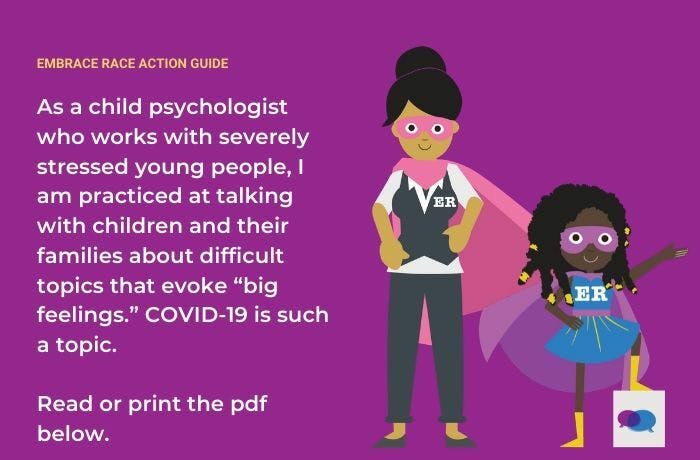How to talk to your children about COVID-19
by Dr. Allison Briscoe-Smith

As a child psychologist who works with severely stressed young
people, I am practiced at talking with children and their families
about difficult topics that evoke “big feelings.” The COVID-19
virus and the disruption and uncertainty it’s brought have added
considerable stress to families and kids - to all of us - that we
need to attend to. Here are my suggestions for how to approach
COVID-19 with children. This advice draws on the major themes
and best practices put forth by people and organizations serving
children in this time.
Put on your own oxygen mask first.
In this time of extraordinary level of stress and anxiety, parents and other caregivers have to do things to make sure we ourselves are well so that we can provide great connection and care to our children. One concrete thing to do is:
- Create a list of “little things” that bring you joy - things like stretching in the morning, using a favorite lotion, reading an old book that brings you comfort and make sure that you are trying to do one of those small things each day.
Ask and listen.
Our kids are listening and seeing. My two-year-old, who I was sure didn’t understand what was going on, made a clinic yesterday for all the “babies” in the house, taking their temperatures. Don’t underestimate what children are getting - they are getting a lot - and ASK THEM. We focus a lot on what we can tell children, but let’s be sure also to ask them questions.
- We can ask simple questions like “what do you think is going on?” “what’s it like to not be at school?” “What do you want to know about COVID 19?”
Then tell.
After you have listened to your children, figure out what you want them to know. Don’t over promise. We don’t know where things are going and how things will turn out, but we can work to make this moment, this day, as safe as possible. Figure out what you want to communicate to your kids and don’t make up answers to things you don’t have answers to. Create small moments of safety in connection, rather than making grand promises that you can’t actualize. For example, say:
- “You are asking great questions. I don’t have the answer to them all but right now I know that you are here and safe.”
Grace period.
Let’s remember that this is a big transition. Let’s give ourselves and our children a little bit of grace time to make mistakes, time to change up the routine, time to have big feelings, time to be nervous. Many of you chose NOT to be teachers, so why would you become a great first or seventh-grade teacher now? If learning at home and via the internet was so easy, then everyone would be doing it. Let’s give ourselves and our families compassion and a grace period for “getting it right”.
- “I know it’s hard to do all this work at home. It’s ok if we don’t get it right or perfect right now; we are learning together.”
Action.
We can be overwhelmed with the plight of others so let’s make small moves into action: letters to people who are stuck in their homes, notes of gratitude to those who check in on us, calls to loved ones. Pay attention to all the amazing ways that people are helping each other! Remember that we are doing all of this in the service of others - let’s pay attention to that and explain that to our children. As Mr. Rogers said, “look for the helpers.”
- “Let’s write a letter to Aunty. I know she’s missing you.”
Recalling resilience.
Lastly and most importantly, remember we are resilient and the only reason we are here is because we come from people who have survived the apocalypse before. For example, as a black person in the United States, I know that I had an ancestor who survived the Middle Passage. There are some of you reading this message only because your ancestors survived the Holocaust. Let us reach back to the history not only of survival, but of thriving - let’s remember that, cultivate that, and tell those stories to our children!
- “You know when I was little I went through hard things, and this is what I learned.”
For more from Dr. Allison, also check out EmbraceRace’s webinar, Supporting children in the struggle against COVID-19.
Allison Briscoe-Smith



